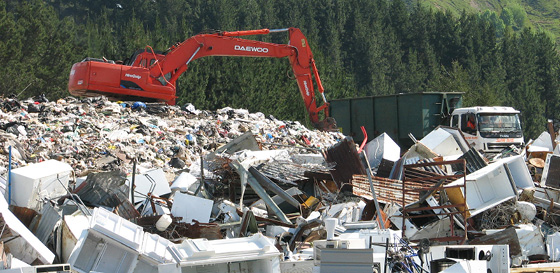Fri 14 Dec 18
Ruapehu celebrates adoption of new Waste Management and Minimisation Plan
Ruapehu has adopted its Waste Management and Minimisation Plan (WMMP) and with it an aspirational vision of being Zero Waste by 2040'.
The Zero Waste by 2040' aspirational vision was one of a number of changes to the draft WMMP that were brought about from the public consultation process.
Other consultation driven amendments included allowing for greater community involvement in the solid waste activity and the introduction of kerbside food waste collection.
Ruapehu Mayor Don Cameron said that it was great to finally have the WMMP adopted following an extensive 12 month development process and an extended public engagement period.
One of the significant things highlighted by the process is that Council and the community share the same vision for ensuring that Ruapehu minimizes its waste footprint, he said.
Like the rest of NZ we have some big challenges ahead in protecting and improving our environment and meeting our national environmental obligations.
The WMMP now provides the blueprint and necessary flexibility for ensuring we can maintain the development of safe, prosperous rural communities that are able to capitalise on our agriculture, business and tourism sectors while sustaining our beautiful environment.
Mayor Cameron noted that the underlying goal driving the WMMP is all about minimising the amount of waste going to landfill.
Council fully supports the principle of zero waste which requires us to manage our waste issues locally wherever possible.
With the imminent closure of the district landfill, following the expiry of the current consent in 2020, Council will now develop a cleanfill site in Taumarunui and transport all other residual waste to a suitable facility outside the district for processing.
The introduction of kerbside food waste collection combined with industrial composting is a critical aspect to the WMMP.
We know from past waste audits that up to 50% of what is picked up kerbside can be compostable material such as food waste.
The kerbside collection regime is proposed to change to having food waste and blue bin recycling collected every week and pink bag rubbish collection only every second week.
Based on current costings people on kerbside collection will see increased charges of $90 per annum to cover the new foodwaste service however if households use one less pink bag per fortnight this will save them $98.80 per annum.
Mayor Cameron said two areas that the public submitted on but were not adopted are the expansion of plastic recycling from 1 and 2 only to include plastics 3-7 and the introduction of a pink bag subsidy for Community Service Card holders.
Research found that due to changes in the international plastics recycling market plastics 3-7 are now being stockpiled and some councils that previously accepted them for recycling are no longer doing so.
If the situation changes and Council finds it can have plastics 3-7 recycled in an environmentally friendly, ethical and economically feasible way the WMMP has the flexibility to allow for this.
Likewise for the proposed pink bag subsidy for Community Service Card holders where research shows that there is no hard evidence that it would reduce illegal dumping or burning.
The WMMP also provides other ways for people to reduce the amount of pink kerbside refuse bags needed which reduces household waste costs.
Mayor Cameron said that if the WMMP is going be successful we need households and businesses to be prepared to make changes to their behaviour with a much bigger commitment to reducing, reusing, recycling and composting.
For many people this will require a change to their current behaviour however we don't believe this needs to be difficult or time-consuming with a little organisation and understanding, he said.
*END*


